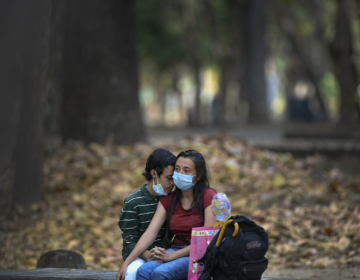Fear and anxiety spreading more quickly than Ebola virus
Listen
Greatly magnified view of the Ebola virus. (Shutterstock)
The Ebola outbreak has dominated the news for several weeks now, and experts say all this coverage could cause high levels of anxiety, especially among kids.
Philadelphia resident Emma Abrams, 12, said Ebola has been on her mind a lot lately, especially since the first cases were identified in the U.S. “It’s a little bit of a scary thought, because you’re thinking, ‘Oh, I could get this disease,'” said the Masterman student.
Though she tries to push the topic from her mind, Emma said any time she goes online, or looks at the news, she sees more coverage. “I try not to think about it, but it’s always kind of like, ‘Oh, Ebola is the headline every day and everywhere.'”
Her mother, Lisa Lobree, has noticed her daughter’s anxieties around the issues, and has been trying to calm her down. “I tell her we have to do our best not to live in fear,” Lobree said.
A lot of news coverage around a disease can skew our view of how dangerous or contagious it is, said Villanova University communications professor Derek Arnold. He added that a lot of news stories just tease out possibilities and “what if” scenarios, but they get people thinking about worst-case scenarios.
“Even if the likelihood is not good that something spreads, it gets people’s edge up, the media is right there to say, ‘This is probably not going to happen, but here is a story,'” said Arnold.
Psychologist and anxiety expert Tamar Chansky says for people who are worrying a lot about Ebola, it’s important to continue to put the real risk of an infection into context. She also says parents should calm their own fears before talking to their kids about the situation.
“If we are sounding scared, if we’re sounding really concerned, our facial expressions, the tone of our voice, all of that can speak volumes to children more than the actual words we are saying,” she said.
Her advice is to begin conversations with children with questions, rather than information.”So that they can get a read on where their children are emotionally with the issue, and perhaps also on what information they already have.”
It’s important to tell kids that, right now, there is nothing they need to do differently, no precautions they need to take at school or at play to avoid catching the virus, Chansky said.
WHYY is your source for fact-based, in-depth journalism and information. As a nonprofit organization, we rely on financial support from readers like you. Please give today.





